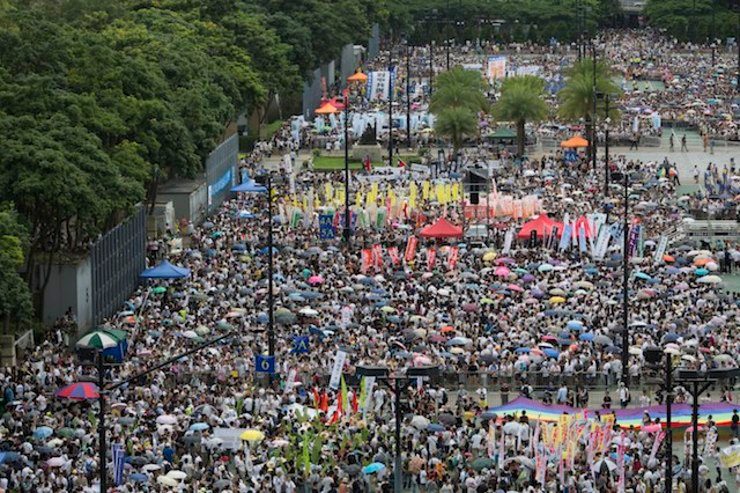SUMMARY
This is AI generated summarization, which may have errors. For context, always refer to the full article.

HONG KONG – Waving colonial-era flags and chanting anti-Beijing slogans, more than half a million protesters took to the streets of Hong Kong to rally for democratic reforms Tuesday, July 1, organizers said, claiming the largest turnout since the city was handed back to China.
The scale of the rally reflects surging discontent over Beijing’s insistence that it vet candidates before a vote in 2017 for the semi-autonomous city’s next leader.
It comes after nearly 800,000 people took part in an informal referendum demanding that voters be allowed a say in the nomination of candidates, which Beijing branded “illegal and invalid”.
The protest route from the city’s Victoria Park to the skyscraper-packed Central business district was a sea of umbrellas to combat heavy downpours and banners emblazoned with slogans including “We want real democracy” and “We stand united against China”.
Despite soaring humidity and rainstorms, swarms of protesters poured onto clogged streets through the afternoon and evening.
Johnson Yeung, a rally organizer, said at least 510,000 protesters had attended – believed to be a record for July 1 protests, an annual outpouring of discontent directed at both China’s communist government and the local leadership.
“This year people came out braving the rain and wind and many citizens joined along the way,” Yeung told a cheering crowd in the city’s Central business district late Tuesday.
Yeung told Agence France-Presse that the turnout marked a “record” since the handover.
Official estimates of the turnout were more conservative, with police saying 98,600 people took part during the “peak” of the rally, without elaborating.
Late-night sit-in
Following the march, hundreds of protesters staged a sit-in on a street in Central late into the night, vowing to stay until 8 am Wednesday, July 2 (0000 GMT). But police began to remove them just after 3 am, leading some away individually onto coaches, an Agence France-Presse photographer at the scene said.
Police said that the sit-in was illegal and protest leaders urged demonstrators not to resist, but some refused to move, linking arms and sitting on the ground as police tried to lift them.
A police spokeswoman could not immediately confirm if arrests had been made or how many protesters had been removed.
Another sit-in was also held outside government offices.
“There is a strong desire for genuine democracy that offers choice and competition without (political) vetting,” Anson Chan, a former number two official in Hong Kong who is now a pro-democracy activist, told reporters earlier Tuesday.
The chairman of the Hong Kong post office union, marching in the muggy heat, said the city’s government was kowtowing to Beijing.
“This march is not for us, it’s for our children. Without universal suffrage there’s no way to monitor the government,” said Ip Kam-fu.
The city’s Chief Executive Leung Chun-ying sought to strike a conciliatory note, saying his government would do its utmost to forge an agreement on implementing universal suffrage.
He offered no details on the 2017 election when he spoke at a ceremony earlier Tuesday marking the 17th anniversary of the city’s handover from former colonial power Britain.
Fears over freedom
A handful of marchers pushed against police barricades during the main rally but it was largely peaceful, and a carnival atmosphere prevailed on several stretches of the route.
In one street performance, a model tank hurtled towards a protester, pointing its gun barrel at his neck as he attempted to push back.
“Hong Kong is turning into a place with less and less freedom,” Eric Wong, a 24-year-old photographer who took part in the rally, told Agence France-Presse. “It is transforming into the mainland.”
Under the “one country, two systems” agreement reached at the time of the handover, Hong Kong enjoys liberties not seen on the mainland, including free speech and the right to protest.
But there are heightened fears that those freedoms are being eroded.
Concerns increased in June when Beijing published a controversial “white paper” on Hong Kong’s future, widely seen as a warning to the city not to overstep the bounds.
“They (Beijing) promised Hong Kong people a high degree of autonomy. Now they are trying to take everything back,” lawyer and veteran democracy campaigner Martin Lee told Agence France-Presse.
Pro-democracy group Occupy Central, which organized the unofficial referendum, has said that it will stage a mass sit-in in the city’s business district later this year unless authorities come up with acceptable electoral reforms.
The poll, which ended Sunday, June 29, gave three options for the election of the city’s next leader – all of which included the public having some influence on the selection of candidates.
China has promised to let all Hong Kong residents vote for their next leader in 2017 – currently a 1,200-strong pro-Beijing committee chooses the city’s chief executive.
But it says candidates must be approved by a nomination committee, which democracy advocates fear will mean only pro-Beijing figures are allowed to stand. – Rappler.com
Add a comment
How does this make you feel?
There are no comments yet. Add your comment to start the conversation.